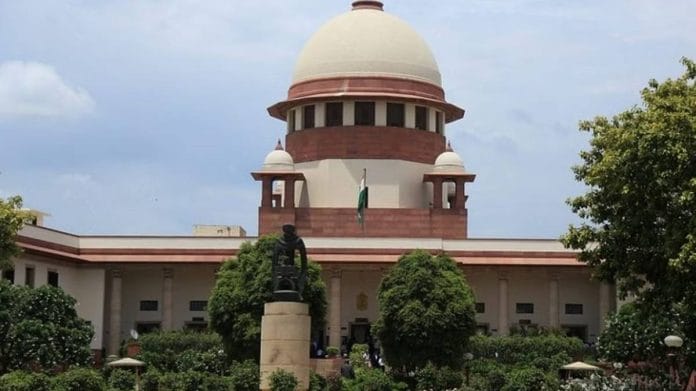New Delhi: The Supreme Court Thursday asked the Centre to evolve a policy for identifying the creamy layer even within the scheduled castes (SCs) and scheduled tribes (STs) to exclude them from affirmative action of reservation. At present, the principle of creamy layer applies to only Other Backwards Classes (OBCs).
Justice B.R. Gavai, the second senior most judge on the seven-judges bench, which Thursday, by 6:1, affirmed the jurisdiction of states to sub-classify SCs/STs to grant them a separate quota inside the reserved category, said that since the ultimate aim of reservation is to realise real equality in the country, the creamy layer should be identified and taken out of the fold of reservation policy.
Justice Gavai, who concurred with the majority view written by Chief Justice of India D.Y. Chandrachud, wrote a separate opinion in which he also dealt with the creamy layer concept in SCs/STs. He found support from four other judges — Justices Vikram Nath, Manoj Mishra, Pankaj Mithal and S.C. Sharma — on not letting the creamy layer in SCs/STs avail reservation benefits.
Justice Bela Trivedi authored a dissenting note in the case.
“Putting the children of the parents from the Scheduled Castes and Scheduled Tribes who on account of benefit of reservation have reached a high position and ceased to be socially, economically and educationally backward and the children of parents doing manual work in the villages in the same category would defeat the constitutional mandate,” said Justice Gavai.
He added that the Constitution itself recognises the SCs and STs to be the most backward section of the society. And, hence, the parameters for the exclusion from the affirmative action may not be the same that is applicable to other classes.
However, if a person from such a category, by bagging the benefit of reservation, achieved a position of a peon or maybe a sweeper, he would continue to belong to a socially, economically and educationally backward class, the judge said, explaining the distinction between the creamy and non-creamy layer within the SC/ST community.
At the same time, the people from this category, who, after having availed the benefits of reservation, have reached the high echelons in life cannot be considered to be socially, economically and educationally backward so as to continue availing the benefit of affirmative action, Justice Gavai added.
“They have already reached a stage where on their own accord they should walk out of the special provisions and give way to the deserving and needy,” he observed.
“I am, therefore, of the view that the State must evolve a policy for identifying the creamy layer even from the Scheduled Castes and Scheduled Tribes so as exclude them from the benefit of affirmative action. In my view, only this and this alone can achieve the real equality as enshrined under the Constitution,” the judge noted.
He said, though the concept of equality enshrined in the Constitution has been considered to be equal treatment among equals and unequal treatment among unequals, it is not necessary that equal treatment to unequals in the category of SCs would advance the constitutional objective of equality.
“Can a child of IAS/IPS or Civil Service Officers be equated with a child of a disadvantaged member belonging to Scheduled Castes, studying in a Gram Panchayat/Zilla Parishad school in a village?” the judge wondered, saying to bracket the two categories would obliviate the equality principle enshrined in the Constitution.
Justice Gavai quoted few judgments from the Supreme Court that have in the past spoken about introducing the concept of creamy layer in SCs/STs and observed, “It has been held that the Constitutional Courts, when applying the principle of reservation, will be well within their jurisdiction to exclude the creamy layer from such groups or sub-groups when applying the principles of equality under Articles 14 and 16 of the Constitution of India.”
Only unequal treatment to unequals can help in the realisation of real equality, the judge said.
Also read: ‘Substantive equality of opportunity’ — why Supreme Court empowered states to sub-classify SCs & STs
‘Reservation has to be limited only for 1st generation’
In his separate opinion, Justice Mithal supported Justice Gavai’s sentiments on creamy layer and called for a periodical exercise that should be undertaken to exclude the class of person who after taking advantage of reservation are on par with the general category.
Justice Mithal observed that the state is entitled to take steps for weeding out socially, economically and educationally advanced sections of scheduled castes and scheduled tribes from the ambit of reservation.
“The reservation, if any, has to be limited only for the first generation or one generation and if any generation in the family has taken advantage of the reservation and has achieved higher status, the benefit of reservation would not be logically available to the second generation,” the judge added.
He further said: “If any member of designated backward class acquires a higher status and attains equality with the forward class, it is difficult to comprehend how his children would be treated as depressed, downtrodden or backward in any manner be it socially, economically or educationally.”
Therefore, the caste to which such a person belongs to may not be excluded as whole from the benefit of reservation but certainly the family that has obtained the benefit once shall not be allowed to take the benefit of reservation for the next generation.
(Edited by Zinnia Ray Chaudhari)
Also read: ‘Bail restores liberty, can’t be curtailed casually’ – SC on why stay must be in rare circumstances






